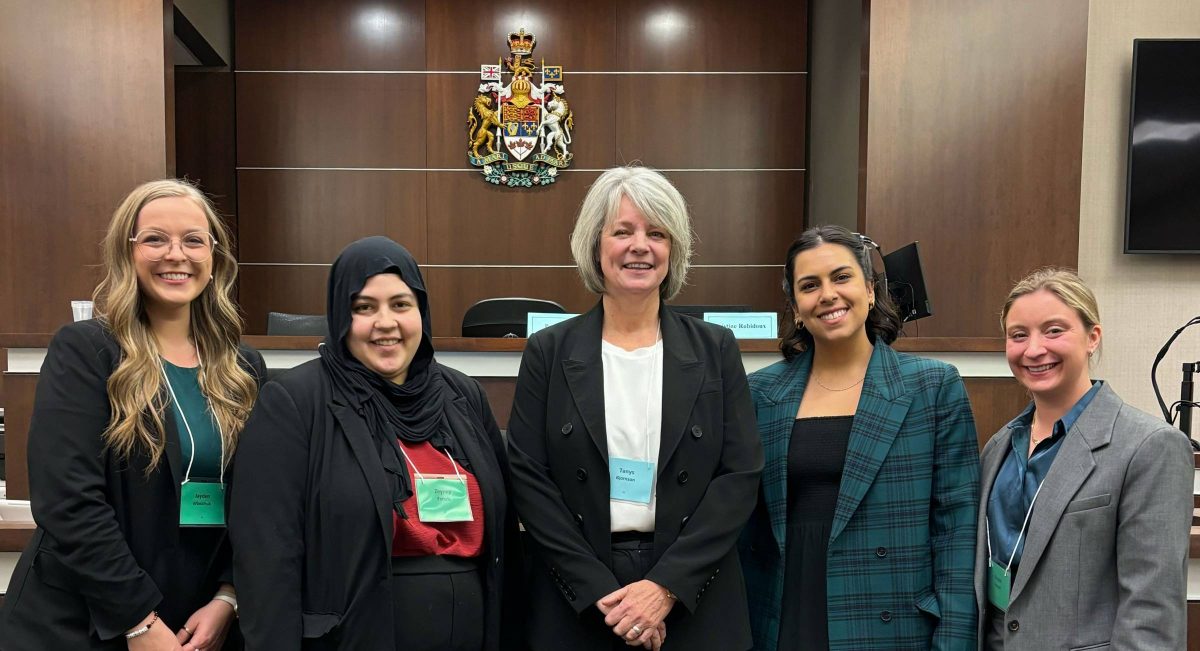
Moot Report 2024: A season of excellence
‘Spirit’ awards and fourth-best oral argument recognition follow mooters home
The 2024 Moot season held another year of excellent learning opportunities for law students and resulted in several triumphs for the Manitoba moot teams. Awards won included the Spirit of the Laskin Award, the Spirit of Negotiation Award for the French stream of the Canadian National Negotiation Competition (CNNC), and recognition for the fourth-best mooter in the all-French language Bastarache moot.
The Spirit of the Laskin Award seems to follow Manitoba law students home to Robson Hall fairly often, since they have won it no less than four times in the past seven years. The recipient team is chosen by all participating teams and is given to the team best embodying the principles behind the Laskin which include congeniality, camaraderie, hard work, and commitment to bilingualism. Jayden Wlasichuk (3L), Zeynep Fattah (3L), Maia Bacchus (2L), Kirsten Nynych (2L) and researcher Ashley Slagerman (3L) made up the Spirit-winning Laskin team.
Éric Gagnon (3L) and Seth Lozinski (3L), both students in the Access to Justice in French concentration at Robson Hall, won the CNNC (French stream) spirit award while Brent Tichon (2L), also in the A2J French concentration, was recognized as the fourth-best mooter for his oral arguments at the French language Bastarache moot.
Manitoba students competed in a total of 10 national moot competitions in 2024, including:
- MacIntyre (Western) Cup Moot (February 9 – 10, Edmonton, AB)
- Gale Cup (February 9 – 10, Toronto, ON)
- Jessup Moot (February 22 – 24, Ottawa, ON)
- Fox Moot (February 23 – 24, Toronto, ON)
- National Family Law Negotiation Competition (February 27 – 29, Online)
- Laskin Moot (February 29 – March 2, Calgary, AB)
- Bowman Tax Moot (March 1 – 2, Toronto, ON)
- Canadian National Negotiation Competition (March 1 – 2, Montreal, QC)
- Kawaskimhon Indigenous Moot (March 8 – 9, Kamloops, BC)
- Bastarache Moot (March 22 – 23, Ottawa, ON)
MacIntyre (Western) Cup (February 9 – 10, Edmonton, AB)
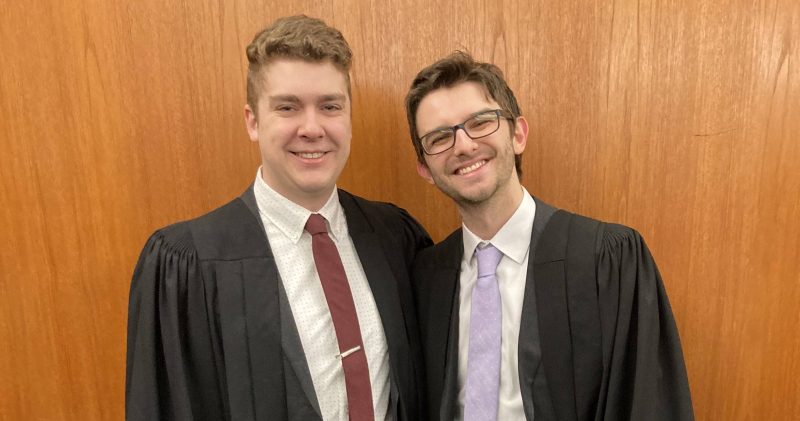
MacIntyre (Western) Cup team Tyson Priebe (3L) and Noah Scatliff (3L).
The 2024 team consisted of Noah Scatliff (3L) and Tyson Priebe (3L) and was coached by Evan Roitenberg, Adam Gingera and Laura Robinson. Scatliff and Priebe qualified as the UM Faculty of Law’s representatives for the Western Cup after finishing in First and Second place in the 2023 Solomon Greenberg competition held in-house at Robson Hall last fall.
“We didn’t win, but it was a very fun weekend,” said Scatliff, keeping a positive outlook. “I really feel like Tyson and I held our own. We fought well and had some great moments.”
All of the teams bonded over similar experiences encountered while facing a very tough moot judiciary which challenged them. Even still, Scatliff said, “the trial was still a law school highlight for me.”
Personally, I learned that there will always be issues that you can’t prepare for, but that’s part of being a trial lawyer! Prepare as much as you can, but be ready to roll with the punches.”
– Noah Scatliff (3L)
Priebe, who is a Student Supervisor with the University of Manitoba Community Law Centre, added, “The Manitoban community that got us to the McIntyre Moot was wildly supportive, and we had an entirely positive experience at every stage of preparation for this moot. Our coaches gave so much of their time to help us practice, Judge Killeen volunteered to judge a full practice run-through with us, and we had many others cheering us on from the sidelines throughout the entire process. After the moot itself ended, we felt extremely encouraged by the amount of support we had received, and I for one am very excited to start my legal practice in this community.”
Scatliff will be articling at a corporate firm, while Priebe will article with prosecutions.
Gale Cup (February 9 – 10, Toronto, ON)
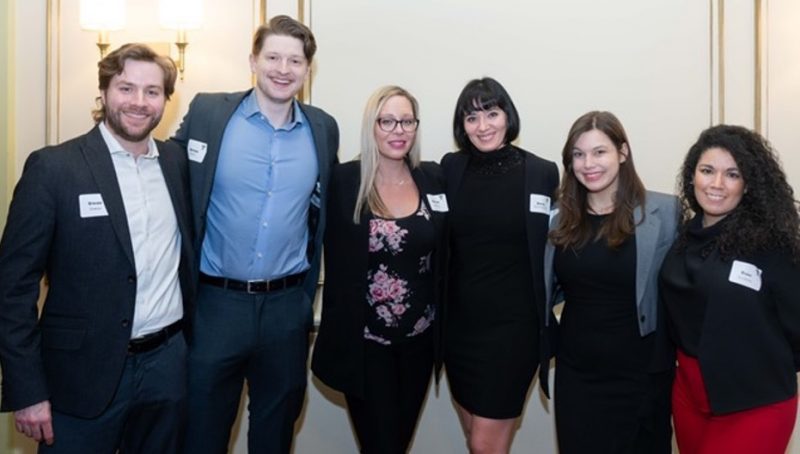
Manitoba Gale Cup team 2024: Steven Csincsa (3L), Nathan Dueck (3L), Melissa Hazelton and Dayna Queau-Guzzi (coaches), Lauren Corcoran (3L), and Diana Gutierrez (3L).
Crown Attorney Dayna Queau-Guzzi and Melissa Hazelton coached the Gale Cup Moot team, consisting of Steven Csincsa and Lauren Corcoran (Appellant Team) who competed against the University of Toronto), and Nathan Dueck and Diana Gutierrez (Respondent Team) who competed against the University of Victoria. The team researcher was Caitlin Madden (3L).
Between February 9-10 the students competed at the Ontario Court of Justice in Toronto arguing the R v Beaver, 2022 SCC 54 decision – which dealt with warrantless arrest and Charter issues (ss. 9 and 10) in the context of s. 24(2).
According to Queau-Guzzi, “While they did not advance to the finals, they did an absolutely amazing job and their preparation paid off!”
Practicing over the course of two months, Queau-Guzzi said the students would argue in the Manitoba Court of Appeal (courtroom 330 at the downtown Winnipeg Law Courts building), before various judges and justices of the three levels of court.
“On their last practice, on February 6, they actually appeared before a panel of current Manitoba Court of Appeal justices, including the newly appointed Chief Justice Rivolaen, and Justices Kroft and Turner,” said Queau-Guzzi. “The panel was very impressed with our students and the Chief Justice remarked that she “hoped all of the students would remain in Manitoba and become litigators.””
Jessup Moot (Feb 22nd – 24th, Ottawa, ON)
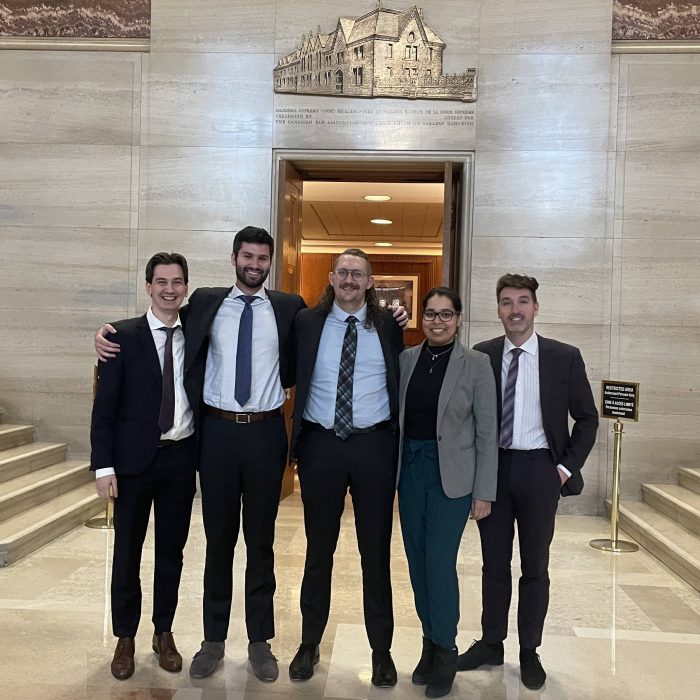
Manitoba Jessup Moot team 2024: Stefan Leicht (2L), Liam Brown (2L), Eric Epp (3L), Sawarn Benning (3L) (researcher) and Brandon Leverick (3L) at the Supreme Court of Canada in Ottawa for the Jessup Moot, February 22 – 24.
Team Manitoba for the Jessup International Law moot consisted of: Stefan Leicht (2L), Liam Brown (2L), Eric Epp (3L), Sawarn Benning (3L) (researcher) and Brandon Leverick (3L). The team was coached by Assistant Professor Gillian MacNeil.
This year’s Jessup team was the last to be selected by the previous method of choosing from applications submitted during the summer. None of this year’s participants had yet taken the Public International Law course which had not actually been offered at Robson Hall since 2020. That, however, is now changing with the Faculty stepping up to make its students more competitive and prepared for this prestigious international moot.
While future team members will be selected from those enrolled in the soon-to-be-offered Public International Law course this fall, the 2024 team had a fantastic experience, finding it “exhausting and exhilarating at the same time,” according to Brandon Leverick (3L). “One thing that really stood out to me was the sense of community,” said Leverick. “Almost everyone there, including judges and coaches, have gone through the same mooting experience. Although it is hard, they clearly want you to succeed and ask tough questions to get you to shine with your knowledge and the work you put in.”
“I would recommend anyone interested in international law to compete at Jessup because it’s one of the few opportunities you get to learn about this area of law and it’s a great networking opportunity.”
– Brandon Leverick (3L)
MacNeil, who will be teaching the Public International Law course next year, said, “I thought the team did well. They competed in three rounds, some in front of a ‘hot’ bench and some in front of a ‘cold’ bench.”
A ‘hot’ bench, she explained, means judges who ask a lot of questions, purposefully trying to pull mooters off-script. ‘Cold’ bench judges maintain poker faces and keep students wondering. The general trend at the Jessup Moot, MacNeil explained, is for a ‘hot’ bench where judges constantly try to get the mooters stuck. “A lot of judges do the Jessup year after year,” MacNeil said. “It’s designed to test advocacy skills and makes for a good learning experience. It’s all in good sport.”
“Dr MacNeil was such a supportive coach,” said Leverick. “She [judged] every round and provided constructive feedback. I hope she continues to coach the Jessup!”
Harold G. Fox Moot (February 23 – 24, Toronto, ON)
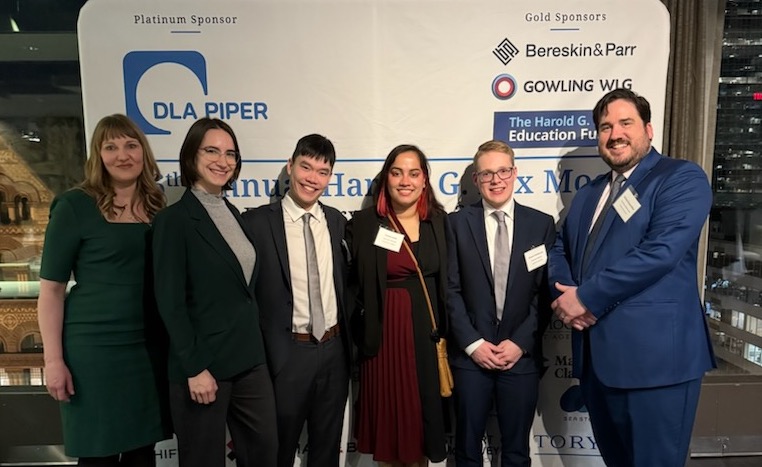
Manitoba Fox Moot team 2024: Heather Morris (3L), Kerith Tung (3L), Trusha Dash (3L), and Connor Giesbrecht (2L)
This year’s Fox Moot team was comprised of: Connor Giesbrecht, Kerith Tung, Trusha Dash (3L), and Heather Morris. Denise Sarmiento was the researcher and coaches were Julia Ryckman [JD/2016] (Fillmore Riley LLP) and Kelsey Desjardine [JD/2009] (Department of Justice Canada).
“Participating in the Harold G. Fox Moot was a journey filled with invaluable experiences and personal growth,” said Morris, reflecting on the experience. “The moot provided me with a platform to refine my research, writing, and oral advocacy skills under the mentorship of my coaches, which confirmed my interest in litigation. Advocating in front of federal court judges and esteemed Intellectual Property lawyers was a thrill. I met law students from across the country and shook hands with Supreme Court Justice Suzanne Côté. Travelling with my teammates was an adventure in itself. I will cherish the memories and inside jokes we made along the way. Overall, the Harold G Fox Moot was an enriching experience that I would recommend to students at Robson Hall.”
Morris, who is interested in civil litigation, privacy and intellectual property law, will be articling at the Alberta Court of Appeal and then Norton Rose Fulbright.
The team expressed many thanks the coaches along with former coach and mentor, John Myers [JD/1990], who is a partner at Taylor McCaffrey LLP and a long-time Intellectual Property lawyer.
National Family Law Negotiation Competition (February 27 – 29, co-hosted online by the Faculty of Law, University of Manitoba and Osgoode Hall Law School of York University)
The Family Law moot team for Manitoba consisted of 2Ls Elise Alider and Eric Moon, and 3Ls Alyssa Thomas, Kali Faingold and Kennedy Merrill represented Manitoba at the NFLNC, and were coached by Mercedes Ayala [JD/2018] (Mitousis Lemieux Howard Law Corporation), Adrianna Aiello (MLH), and Stéphanie Bauch (MLH). The Competition took place online this year and was co-hosted by both the UM Faculty of Law and Osgoode Hall Law School.
“The National Family Law Negotiation Competition was an incredibly unique experience. Having the opportunity to be coached by experienced lawyers about negotiation skills in family law is something that we will carry with us as we move into our practices,” said team member Kali Faingold. “Competing against other dedicated law students and learning from their negotiation styles gave us different perspectives on how to successfully negotiate to reach an outcome that works for all parties.”
Mercedes Ayala, a 2018 alum of Robson Hall and family lawyer at MLH, said that the team participated in three rounds of negotiations on various family law issues. “Great job students!,” she said. “Negotiation allows for resolution outside Court, assisting families in maintaining their relationships intact and to move forward. We lawyers were proud to watch the next generation of lawyers learn the skills which will be integral to their practice!”
Laskin Moot (February 29 – March 2, Calgary, AB)
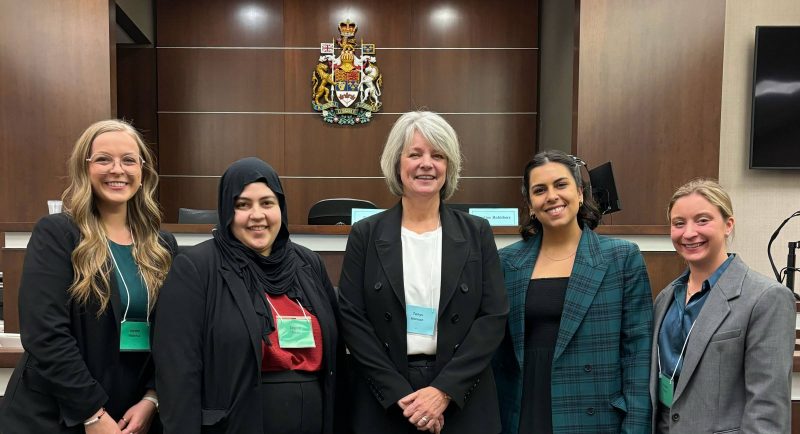
Manitoba Laskin Moot team 2024: Jayden Wlasichuk (3L); Zeynep Fattah (2L); Tanys Bjornson (coach); Maia Bacchus (2L); and Kirsten Nynych (2L) [Missing from the photo are researcher, Ashley Slagerman (3L) and coach, Tamara Edkins (Justice Manitoba)
The Spirit Prize-winning Laskin team consisted of Jayden Wlasichuk (3L), Zeynep Fattah (2L), Maia Bacchus (2L), Kirsten Nynych (2L) and researcher Ashley Slagerman (3L) who were coached by Tanys Bjornson and Tamara Edkins (Manitoba Department of Justice). Maia Bacchus, a student in the Access to Justice in French Concentration program, submitted her argument in French, thus fulfilling this bilingual moot’s requirement for mooters to compete in both French and English.
“The Laskin Moot was such an incredible experience,” said Wlasichuck. “There were dozens of students from across Canada all together in Calgary to moot about constitutional and administrative issues relating to Artificial Intelligence – thank goodness we only needed to know the law, not the technology!”
UM was awarded the ‘Spirit of the Laskin’ award, the recipients for which are selected by the other mooting teams and given to the school that best showcases the spirit of the competition – making friends and building community. “UM won this award last year, so we were honoured to bring it home again, and to tie with the Moncton team,” Wlasichuk explained. “The Laskin was such a great learning experience, and one of my favourite times of law school!”
“The Spirit of the Laskin means so much to us, and we are proud that the other teams thought of us when they voted. The Laskin was a wonderful opportunity for us to make connections before we go off to practice law – and it’s a great practical experience that we can carry for the rest of our careers!”
– Jayden Wlasichuk (3L)
Bowman Tax Moot (March 1 – 2, Toronto, ON)
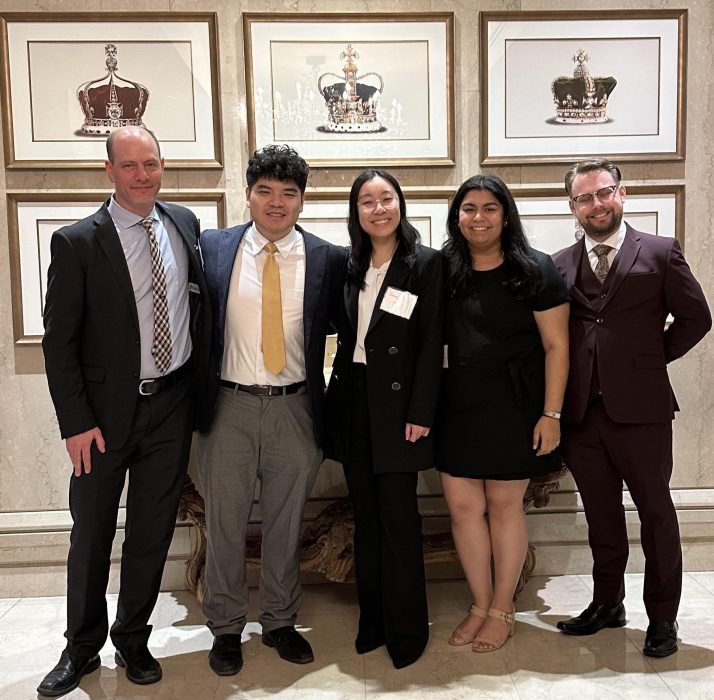
Manitoba Bowman Tax Moot Team, 2024: David Silver (coach), Abiel Kwok, Jenny Bi, Isha Khandelwal, Calvin Ediger (missing, Professor Darcy MacPherson (coach).
The team of Abiel Kwok (3L), Jenny Bi (3L), Isha Khandelwal (2L), Calvin Ediger (3L), with researcher Tobey Xiang (2L) represented Manitoba at the Bowman Tax Moot in Toronto this year. Coaches David Silver, [JD/2012] (Department of Justice), and Professor Darcy MacPherson helped coach the students.
Isha Khandelwal, found her time spent training for the Bowman Tax Moot invaluable. “[P]articipating in the moot was an absolute a highlight of my time at Robson Hall—something I did not anticipate by a longshot. Not only did I have the opportunity to engage with brilliant legal professionals who served as judges throughout our practices, but I was also impressed by the hands-on experience I gained specifically when crafting our factum.”
Every aspect of the work she was exposed to in preparation for the competition helped Khandelwal develop skills that otherwise come once practicing law. “Being a part of a moot was challenging, particularly given the sophisticated subject matter and narrow deadlines, the experience was genuinely beneficial, and I eagerly look forward to applying the skills in my practice.”
Khandelwal expressed thanks to coaches David Silver, and Professor MacPherson for their mentorship and guidance as well. “Not only were they remarkably intelligent and resourceful, but they also demonstrated immense patience and support throughout the entire process leading up to and including the moot itself,” she said.
Canadian National Negotiation Competition (March 1 – 2, McGill University, Montreal, QC)
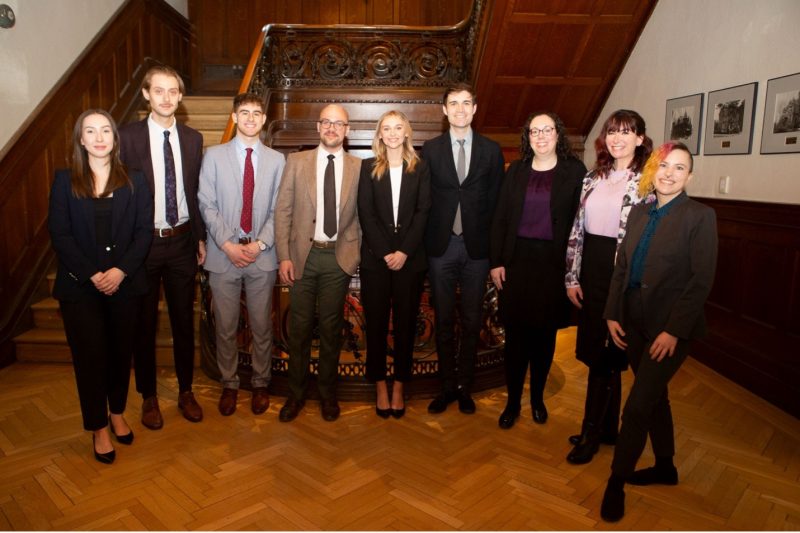
CNNC Manitoba team 2024 left to right: Rebecca Penner (3L); Ryan Hall (3L); Nicolas Nudler (3L); Éric Gagnon (3L), Jamie Robertson (3L); Andrew Torbiak, coach (Tradition Law); Andrea Doyle, coach (Instructor, U of M Law); Heather Wadsworth, coach (Amica Law); and Seth Lozinski (3L).
Three University of Manitoba Faculty of Law teams from Robson Hall recently competed in the eighth annual Canadian National Negotiation Competition (CNNC). The competition was held at McGill University, Faculty of Law in Montreal on March 1st and 2nd, 2024, and for the second year in a row had both a French and an English stream. Against a talented field of the best law student negotiators from across Canada, the three U of M teams of Éric Gagnon and Seth Lozinski; Ryan Hall and Nicolas Nudler; and Rebecca Penner and Jamie Robertson put in extremely strong showings. I was involved in assisting with the administration of the competition, and I heard praise from many people, including judges, coaches, and fellow competitors, about their performances.
The pair of Éric Gagnon and Seth Lozinski, who competed in the French stream, even received the “Spirit of Negotiation” award for that stream, which is peer-nominated and goes to the team that best illustrates the values of collaboration, humility, teamwork and respect. Robson Hall teams have a long history of winning this award. Éric stated, “I was especially honoured to have been chosen by my national peers for the Spirit of the Negotiation prize, alongside my partner Seth Lozinski, for our commitment towards collegiality and collaboration throughout the negotiation process.”
This was the second year that the CNNC implemented a parallel French stream. Teams competed in French, using the same problems (which were translated) as the English stream.
“Preparation for the CNNC was a team effort. I wish to acknowledge and thank the support that was provided to our French team by our students participating in English (Jamie, Rebecca, Nico and Ryan) and their coaches, Andrew Torbiak and Heather Wadsworth, as well as articling students Chris Dick, Norton Rose Fulbright Canada and Kennedy Pinette, MLT Aikins LLP. Chris Dick and Kennedy Pinette, recent graduates of the University of Manitoba Faculty of Law, successfully competed in last year’s inaugural French stream of the CNNC and provided valuable feedback and insights in Éric and Seth’s preparations.”
Kawaskimhon Indigenous Moot (March 8 – 9, Thompson Rivers University, Kamloops, BC)
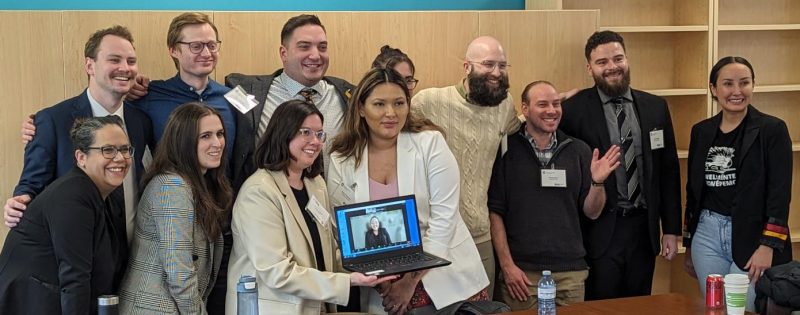
Manitoba Kawaskimhon 2024 moot team members Carlie Kane and Raven Richards help a virtual participant pose for the group photo, front row, 3rd and 4th from the left. Photo by Marc Kruse (coach).
The team of Carlie Kane (3L) and Raven Richards (3L) competed at TRU in Kamloops at the annual Kawaskimhon Indigenous Moot, coached by Marc Kruse, Director of Indigenous Legal Learning and Services, and Daniel Diamond, Assistant Professor.
The Kawaskimhon Moot started at the University of Toronto in 1994 and is hosted by a different Canadian law school each year. The Kawaskimhon is a consensus-based, non-adversarial moot that incorporates Indigenous legal traditions alongside federal, provincial and international law, and concepts of dispute resolution. Teams may represent a variety of parties (depending on the nature of the moot problem) such as First Nations, Band Councils, traditional Chiefs’ organizations, government agencies, and industry.
Kruse explains that the Kawaskimhon serves as a pivotal platform for Robson Hall students and faculty to actively engage with Indigenous academics, students, lawyers, and communities spanning across Canada. “Our team tackled the negotiation representing a National Resource Coalition, offering our students the unique challenge of advocating for a client whose legal position conflicted with their own political beliefs.” Kruse said, describing this year’s problem. “Drawing from a diverse array of Indigenous Legal Orders, including traditional narratives, our negotiation table was rich with cultural guidance. Our students had a significant presence throughout the negotiation process and strongly advocated for their client’s position.”
Learning opportunities arose when the Manitoba students encountered some difficult positions presented by other Teams, Kruse observed, and it became clear there existed a differing of opinions among the students about the relationship between Aboriginal Title and Sovereignty. “Our students navigated the negotiating process in a professional manner and were able to bring forward their client’s position strongly and consistently,” he said.
“The Kawaskimhon moot experience stands out for its departure from the traditional appellate style moot in favor of a negotiation format, which I found refreshing for its conversational and relaxed atmosphere.”
– Carlie Kane (3L)
Kane noted that “The form of negotiation and moderator followed Indigenous protocols, but the final form of our agreement still fell into a colonial common law framework which I found to be a discouraging result.”
From the student perspective, Kane learned that “[e]ngaging in negotiations with law students from various Canadian institutions, both Indigenous and non-Indigenous, offered valuable insights into the diverse teachings and theories of Aboriginal law across our nation’s law schools. The experience underscored the crucial need for more Indigenous representation in legal education and spaces set aside for Indigenous perspectives and methodologies.”
The need for further education and learning about Aboriginal law in Canada was very pronounced during the team’s time at the negotiation table, which Kane said “oscillated between moments of laughter and tension, making it an emotional rollercoaster, which is probably true to practice in that Indigenous folk often express themselves through humor. However, it was emotionally taxing to converse with teams who lacked a nuanced understanding of Aboriginal law and its significance in relation to Aboriginal rights and title, reflecting the disparities in legal education across different law schools.”
An important observation Kane came away with was that some teams tended to prioritize being heard over listening to others, which became problematic for other participants. “Towards the end, it felt like certain teams were selective about whom they were willing to engage with, highlighting the varied educational backgrounds shaping our perspectives,” said Kane. “In the spirit of negotiations, every participant deserves to have their voice recognized. Again, I found my experience probably true to life in that even while settlers are trying to learn and apply Indigenous Legal Orders, Indigenous voices are still left feeling unheard.”
Despite these challenges, the moot provided an invaluable opportunity to forge new connections and relationships. “[The] experience gave me an opportunity to put in practice my understanding of ILO [Indigenous Legal Orders] and how law ought to be practiced. I’m especially grateful for the unwavering support of my colleagues, Raven Richards, Marc Kruse, and Daniel Diamond, whose solidarity and camaraderie sustained me throughout this enriching experience.”
Bastarache Moot (March 22 – 23, Ottawa, ON)
![Team Manitoba left to right: Julien Bédard, coach (Justice Canada), Bradley Légaré (3L), Brent Tichon (2L), Nadine Plourde (2L), and Alexander Bastin (2L) [Missing from the photo is researcher, Samantha Pearce (2L)]](https://news.umanitoba.ca/wp-content/uploads/2024/04/09_Bastarache-2024-cropped-team-photo-800x533.jpg)
Bastarache Moot Manitoba team 2024, left to right: Julien Bédard, coach (Justice Canada), Bradley Légaré (3L), Brent Tichon (2L), Nadine Plourde (2L), and Alexander Bastin (2L) [Missing from the photo is researcher, Samantha Pearce (2L)]
The team of Nadine Plourde (2L), Alexander Bastin (2L), Bradley Legare (3L), and Brent Tichon (2L), supported by researcher Samantha Pearce (2L), competed entirely in French for this competition dedicated to language rights and the legacy of The Honourable Michel Bastarache of the Supreme Court of Canada. The team was coached by practicing lawyers Richard Goulet (Manitoba Hydro) and Julien Bedard (Justice Canada) with Faculty of Law advisor Andrea Doyle [JD/2009].
All members of the team are enrolled in the Access to Justice in French concentration program taught in part by Doyle.
“I’m grateful that I got the opportunity to participate in the Bastarache Moot not only because it was another chance to learn and prove that I can be an effective French advocate, but also because I got the opportunity to represent the Franco-Manitoban community in a mock appeal that touched on a subject that is important to me,” said Légaré. “For me, the best part of the Bastarache Moot was the opportunity to be immersed in a totally French environment composed of people from communities similar to our own.”
As mentioned above, Brent Tichon was recognized as the fourth-best mooter for his oral arguments this year.
Doyle contributed a full report on the Bastarache team’s experience in the UM Today story “Moot Report 2024: Manitoba Team proudly represents at Bastarache Moot.”
Just Between Us: Intramural Competitions at Robson Hall 2023 – 2024 Season
In addition to the two intramural competitions held annually in the fall, namely, the Solomon Greenberg and Robson Hall Negotiations Competition, the Faculty of Law experienced two more during Winter Term.
Mini Moot (March 11 at Robson Hall Moot Courtroom)
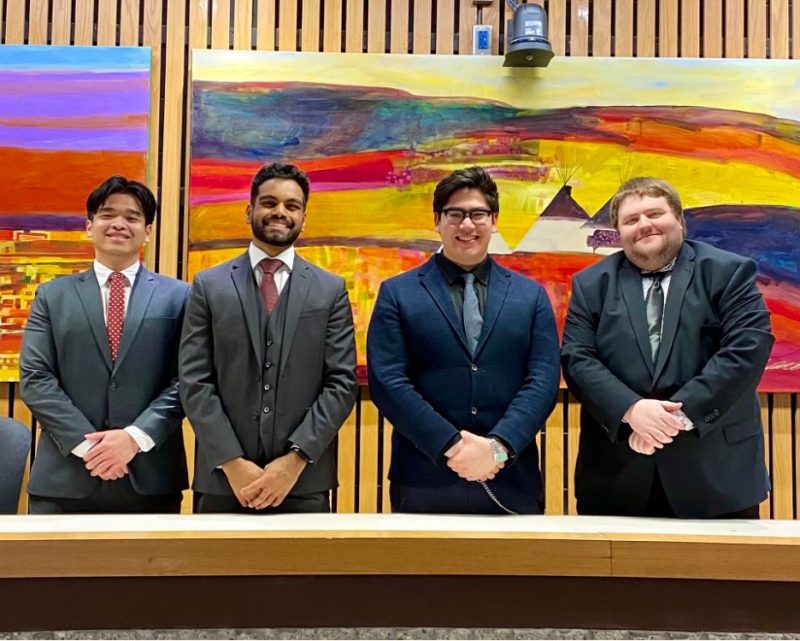
Winners and runner-up teams from the Robson Hall Mini Moot 2024: left to right: runners-up Ken Vong and Sameer Harris. Winners: Sebastien Meiers and Riley O’Hara
The annual Mini Moot is organized entirely by law students on the Clinical Experience Committee and open to first year law students and even Master of Human Rights students. The goal is to give everyone at the Faculty of Law a chance to experience advocacy. Fillmore Riley LLP is a major supporter of this moot in addition to the fall Negotiations Competition.
Art Braid Business Law Case Competition (March 22 at TDS LLP)
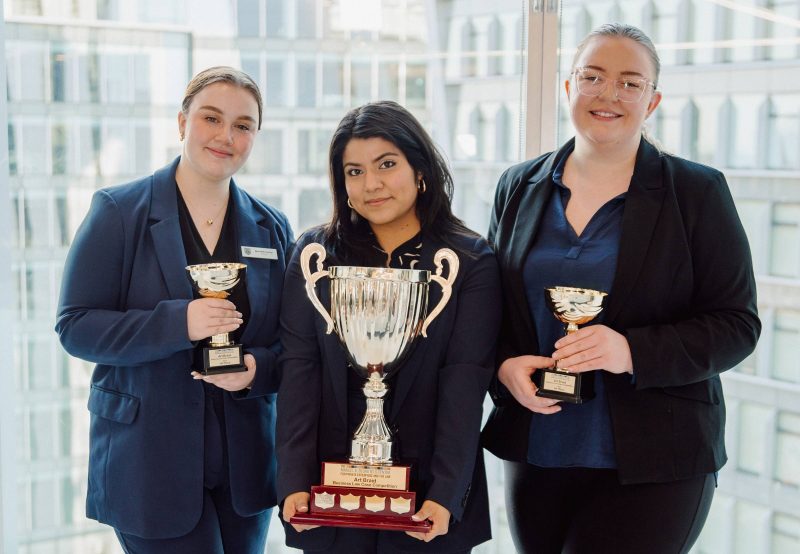
Art Braid Cup 2024 winning team of Moira Kennedy (2L), Maria Garcia Manzano (2L), and Meredith Harley (2L).
The 2nd Annual Art Braid Business Law Case Competition took place on March 22 at the Thompson Dorfman Sweatman LLP law offices in Winnipeg. The competition was organized by Robson Hall’s Business Law Group, hosted by TDS, and supported by the Faculty of Law’s Marcel A. Desautels Centre for Private Enterprise and the Law.
The team of Maria Garcia Manzano (2L), Meredith Harley (2L), and Moira Kennedy (2L) won the Art Braid Cup for 2024.
For the full story, please read “Second Annual Art Braid Business Law Case Competition honours late professor’s legacy” by Rebecca Penner (3L).






